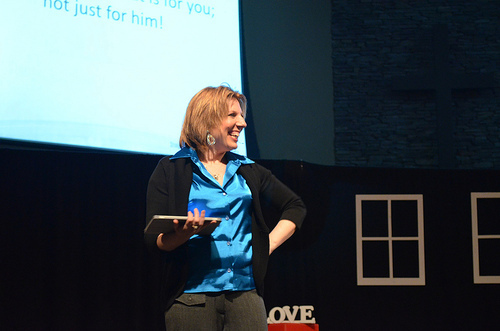Sheila Wray Gregoire's Blog, page 228
September 20, 2013
Anger and the Measure of a Person
Every Friday my syndicated column appears in a bunch of newspapers in southeastern Ontario and Saskatchewan. This week’s column talks about anger and how it disguises itself.
 I have heard it said that you can measure people by the size of the things that get them angry. The smaller the size, the smaller the man. The shorter the fuse, the smaller the person.
I have heard it said that you can measure people by the size of the things that get them angry. The smaller the size, the smaller the man. The shorter the fuse, the smaller the person.
Many angry people don’t recognize that they are the problem. To them, the problem is always something external; it was something else—or someone else—that made them angry in the first place.
It’s easy to blame others for our problems, but no one else can determine your feelings. In the concentration camps, Viktor Frankl said that the one thing the Nazis couldn’t take from them was the ability to choose how to respond. No one can make you angry. Anger is a choice that you make.
Now for some of us it’s a natural choice. Perhaps we were born into angry homes. That anger may not always have been expressed; perhaps it simmered under the surface, until the tension was so great that you had to leave just to escape from it. But you couldn’t completely leave it behind, and that tension has followed you. Or perhaps you lived in a family that was quick to anger and quick to yell. Now that’s just how you express your feelings.
While that may explain why you often erupt in anger, it doesn’t give a pass on the responsibility to confront this personality trait and deal with it. And the first step is recognizing where anger comes from.
Anger is a master disguise artist. We like to think that every time we feel anger it’s righteous indignation: someone did something wrong, and naturally we’re appalled. Yet most anger isn’t the indignation sort, because anger tends to be a secondary emotion. It’s our psyche’s way of dealing with something that makes us uncomfortable. When we feel fear, or feel hurt, we react in anger instead because that seems safer.
Let’s take a woman who is trying to raise three small kids and keep her head on straight. But deep inside she’s worried that she’s doing a bad job. The kids whine, they don’t listen, and the place is always a mess. So what does she do? She starts yelling. She doesn’t want to yell, but the anger is what comes out when she can’t face the fear that she is failing at what is most important to her.
Or what about a guy who is secretly afraid that he’s not a real man? He doesn’t want anyone looking at his family or his home and thinking that he’s not in control, so whenever his teenagers talk back or his wife expresses an independent thought he grunts or yells. Soon no one tells him the truth about anything. They just dance around his anger, and everyone loses.
Living with someone who is angry is exhausting, but living with that kind of anger is awfully tiring, too. So here’s the cold, hard truth: big people confront their fears. They admit them, face them, and deal with them. Small people ignore them by taking their pain and transferring those to other people. They get angry and yell and make everyone else miserable so that they can avoid confronting the fact that they feel like failures, and they’re afraid of the future, and they worry that they are not in control.
If you’re an angry person, then the next time you feel angry, don’t just count to ten before you erupt. Take that time to ask yourself, “what else am I really feeling?” And then deal with that. When we can be big enough to ask the hard questions, we’ll often find that our fears become much smaller, and our life, in turn, much bigger.
Don’t miss a Reality Check! Sign up to receive it FREE in your inbox every week!
// ]]>
The post Anger and the Measure of a Person appeared first on To Love, Honor and Vacuum.




September 19, 2013
Fighting in Marriage: Ending Conflict Quickly
 Fighting in marriage is not fun. Either we never mention what’s bugging us, or we have the same fight, over and over, and rarely resolve anything.
Fighting in marriage is not fun. Either we never mention what’s bugging us, or we have the same fight, over and over, and rarely resolve anything.
I was looking through some older blog posts recently, ones that I wrote before this blog had very many readers, and I came across one that I really liked. So I thought I would share it with you today: how we can resolve conflict in marriage quickly, rather than going round and round.
Fighting in Marriage Is Normal–Everybody Has Conflict
Last week my husband and I had such a textbook fight it was almost funny (in retrospect). Here’s what happened:
I was feeling overwhelmed with a lot of demands on me. I was trying to homeschool. I was working to some writing deadlines. I had things to do at church. I was speaking last weekend (and this weekend), and I had family who needed me.
And in the middle of all that, I didn’t have any time just to be by myself! And I need that “me” time. I had two specific issues with my girls, which were bugging me but which weren’t really the cause of my angst, but they were there nonetheless.
One night I had just had it and I let in to my husband about how busy I felt. I knew this was only for a time; many of these time crunchers would be gone soon, but I was overwhelmed. And I happened to mention my frustration that I couldn’t get Katie to practice piano right (although really this was minor compared to the rest of the things that were bugging me).
Keith’s work was flexible, so he offered to homeschool the girls the next day instead of catching up on paperwork, and I accepted, because he was sweet.
–PAUSE–
Fighting in Marriage Usually Has Trigger Points
Now, before I tell you the rest of the story, what warning signs do you see here? First, I was way overscheduled (that happens to some of us and at times it’s unavoidable. Other times we do it to ourselves by signing up for too many extracurricular activities.)
I didn’t have time just to be myself. We all need that!
And when we get to the end of our rope, little things that normally don’t bother us start to drive us around the bend.
Most of the time when we have conflict, you can trace it back to a trigger point that doesn’t actually have to do with your spouse. You were tired, overscheduled, irritable, hormonal–whatever. Before you blow up at your spouse, always look at yourself and say, am I in the middle of a classic trigger point for conflict? Is this really my spouse’s fault, or am I reacting out of something else? Examine yourself first!
Now, you want to hear what happened?
–End PAUSE here–
Fighting in Marriage is Often Because We See Our Roles Differently
The next day, as Keith was beginning to teach the girls school, he pulled the sergeant major routine. He called the girls down and started railing at them. He was upset at them because they were causing me stress. So I started in at him that he wasn’t really helping me. If he wanted to help me, he wouldn’t yell at the girls because the girls weren’t my problem. But he figured: IF I HAD A PROBLEM, HE HAD TO FIX IT. And since I had been complaining about two specific things the girls were doing (piano practice and sibling bickering), he felt it was time to whip them into shape. But to them, it came out of left field because they had thought that we were all getting along quite well.
So I was mad at Keith for being mad at the girls, he was mad at me for being mad at him, and the girls were just flabbergasted.
Instead of just realizing that he was doing a male thing–trying to fix things–and it would all be okay in the end, I was really angry, because he was supposed to make my day easier and instead he was causing stress for everyone (in my view). He didn’t want to talk about it, so instead of getting some work done, which would have at least lowered my stress issues, I seethed. I thought about how mean he was. I thought about how much he over-reacted. I thought about how he was too hard on the kids.
It is Usually Better to Talk it Through than to Seethe
When he was finally ready to talk, and we had everything out, I realized that both of us had over-reacted. He was just worried about me, and he was genuinely trying to help. He wanted the girls to know that they should never cause me stress, and he wanted to defend me, and I shot him down. But he also needed to know that sometimes I just want to vent. I don’t need him to fix anything; I just need him to listen.
Once we talked about it rationally, we were both soon laughing and hugging and everything was fine. I realized how much Keith loved me, and I felt much better.
The good thing is that the conflict was resolved really quickly–by noon it was over. Even though the anger feelings were as high as they were at the beginning of our marriage, we’re so much better at getting to the root of the problem and talking it out. He listens; I listen; and we’re more ready to forgive.
I think that’s the wisdom that comes with age and experience. I know he truly loves me, and he knows I truly love him. Then, when a conflict occurs and we’re able to think rationally, we realize that the problem can’t be a lack of love; more often than not, it’s just a misunderstanding.
Now, perhaps you’re one who has to collect your feelings and think about things before you talk to your spouse about a conflict. That’s fine. Often those who are more introverted do need more time to process. But, if possible, I do believe that dealing with things as quickly as possible is usually the best route, because often the conflict really is a misunderstanding.
Early in our marriage we would do one of two things: we would either each clam up, trying to will the other person to drag it out of us, or we would be so sure we were right that we wouldn’t even listen to the other person. Now we’ve learned to get it out early.
Inevitably, when two people live together we will have misunderstandings.
We will blow up and get angry occasionally. We will act inappropriately. It takes grace to make a marriage work; grace to our spouse, and grace to ourselves. So next time you’re really angry, take a deep breath, and ask yourself this:
Do I truly believe he doesn’t love me? Do I really think he’s evil? Is this how he usually acts? Or is this something unusual? Am I reading too much into this? Given what I know about my husband, are the things I’m feeling really justified just by what’s happening now?
And then–and I know this is hard when you’re angry–say a prayer that God will help you see your husband through His eyes. God, help me to see the truth in this situation, and not only my own anger.
Gain proper perspective on the argument, and then gain God’s perspective on your husband, and you just may find that listening to your husband and getting the conflict resolved is far easier than you used to think it was!
Do you find that you often get upset at your husband when he tries to fix things? What is the best route for you for resolving conflict quickly? Let me know in the comments!
// ]]>
The post Fighting in Marriage: Ending Conflict Quickly appeared first on To Love, Honor and Vacuum.




September 18, 2013
Wifey Wednesday: Can Christians Be Sexually Incompatible?
It’s Wednesday, the day when we talk marriage! I introduce a topic, and then you follow up either by commenting or by writing your own post and then linking up! Today I want to talk about whether or not Christians can be sexually incompatible when they marry.
Last summer Rachel Pietka caused quite a stir by writing an article called “Christians Are Not Called to Have Amazing Sex.” In it, she argued that Christians were making far too big a deal out of great sex in marriage. In fact, she said, great sex could not be a requirement for marriage, because since God asks us to wait for marriage to have sex, we have no way of knowing whether or not we’re sexually compatible until after we marry. Thus, if God had wanted us to have great sex, and that this was an actual calling, and a requirement for Christian marriages, He would not have ordered chastity first.
Now, I’m paraphrasing, and you can read the whole article here. I already wrote a long post responding to it, talking about why great sex is important in a marriage and shouldn’t be just “pooh poohed”. But one point that I thought merited more attention was this talk of sexual incompatibility, because we’re starting to hear of it everywhere.
So let’s dive into this.
Our Sexual Selves Aren’t Static–They’re Relational
Here’s what sexual incompatibility says: he’s one way, and she’s another, and together we don’t match. We’re made different sexually, and we don’t go together.
The problem with that is that it assumes that we are sexual beings in ourselves, separately from another person. We have this “static” sexuality, and he has a “static” sexuality, and when you match them up, they don’t fit.
Yet what if sex was never intended to be “she’s like that, and he’s like that”, but rather, “together, we’re like this?”
I think the “together” model is far closer to the truth. Yes, we are each born with certain sexual drives. Everybody has these. In fact, our sexuality and our spirituality are very closely linked, because with both sexuality and spirituality we have this deep need and deep drive to be intimate and known.
And it’s that “known” word that’s really important. I explain it in a really humorous way in this video, but in a nutshell, it’s that sex is supposed to be a deep knowing between two people. It isn’t that two people come together and use each other to get their sexual needs met; it’s that our sexuality is supposed to be expressed with another person. Our sexuality is, at heart, relational.
People used to understand this, but if you think about it, it makes sense only if you also believe that sex belongs in marriage. As soon as you take sex outside of a committed marriage relationship, as our culture has done, then the only permanent thing in your sex life is YOU. It’s not US, it’s YOU. So in order for YOU to get your sexual needs met, you have to get to know yourself more, and explore yourself more. That’s why so many sex toys are masturbatory in nature! They’re marketed saying that they will help you know yourself, because you have to know yourself before you can have fun with someone else. But actually, your husband can help you to know yourself better. That’s the way we were designed to work.
We’re meant to be sexual in relationship. If we start saying that two people can be sexually incompatible, then we’re buying into our culture’s view that sex is something that is supposed to be experienced with many people, and that you can be most fulfilled by doing the most with as many as possible, and it’s not true.
Being “Sexually Incompatible” is Simply a Marriage Issue that Needs to be Dealt With
In truth, sexual incompatibility simply means that something is not working well in your marriage. And honestly, that’s quite normal. We all have baggage when we get married, and because our sexuality is so close to our spirituality, it’s deeply personal and harder to deal with than a lot of other conflicts. But that doesn’t mean that we can’t deal with it!
It took my husband and I six years to figure out this part of our marriage, because I had trust issues and frankly sex didn’t feel very wonderful. It would have been easy for us to say that we were “sexually incompatible”–that his libido was higher than mine, and that I was too frigid for him. But instead, we treated it like a problem that had to be dealt with, and gradually we grew together and things got better.
That’s how it is in most marriages. When I wrote The Good Girl’s Guide to Great Sex, I took surveys of thousands of women, and one thing I found was that the best years sexually in a marriage were years 16-24. They weren’t the early years. It takes a while to get things right. But if we believe in “sexual incompatibility”, then we can say, “there’s no point in trying. We weren’t meant to go together.”
Look, we don’t do that in other areas of our marriage. If he leaves laundry on the floor and it drives you nuts, you don’t say “we’re housework incompatible”. You say, “we need to figure out a way around this so that we’re both happy.” Why not treat sex the same way?
“Sexual Incompatibility” Could be About Libido Differences
Often when we say we’re not compatible sexually it’s because one person wants sex more than the other. We tend to think it’s the guy, but in about one quarter of marriages it’s the woman with the higher libido, and she’s left wondering why her husband doesn’t want her.
Yet what if libido differences are actually a vehicle that God uses to push us towards more holiness? I wrote a 3-part series on this a while back, and you can see the round-up (with the links) here, on what does “Do Not Deprive” mean. I do agree with Pietka that God’s main aim for us to develop holiness, not happiness. And I think libido differences push us towards greater holiness, because in order to have a happy marriage we have to adjust. One of us will more naturally bend towards self-control, and one of us will more naturally bend towards passion. Both are good things. And these libido differences help stretch us, so that the one with more self-control learns more passion, and the one with more passion learns more self-control. That’s a good thing!
“Sexual Incompatibility” Could be About Preferences
Sometimes sexual incompatibility is simply that one person is more adventurous in bed than someone else. I’ve written at length on that, and you can find some of those posts here:
How to Decide Your Sexual Boundaries
My Husband Wants Something in Bed I Think Is Gross!
And my ebook 31 Days to Great Sex can also walk you through, step by step, enlarging your boundaries where appropriate, and admitting that some things aren’t appropriate. It helps you communicate and helps you have great fun in your marriage–without violating anyone’s moral code.
Again, this isn’t an incompatibility issue. It’s simply a tool that can help push us towards holiness. We may need to communicate and ask for what we want; we may need to step outside our comfort zone and find real passion; we may need to confront deep-seated fantasies and recognize that these are from harmful sources. Whatever the issue, it’s not your spouse that’s the problem. It’s simply something to work through together by becoming more vulnerable, more humble, and more passionate. And those are all good things, too!
“Sexual Incompatibility” Could Be Simply About a Learning Curve
I’ve had a number of women write to me telling me, “my husband and I just aren’t compatible in bed. He never makes me feel good. It’s just so boring.”
Yet is this really sexual incompatibility–or is it just that they haven’t figured out how to make it feel good yet? Usually it’s the latter, because our bodies were made to feel good together. There’s no reason why they shouldn’t. Sometimes you may have to try different positions to see what feels best, or try more foreplay, but there is no reason why someone can’t learn to make the other feel good.
The problem is usually that we’re really uncomfortable telling the other person what we want, or we don’t truly understand how the other person’s responses work. Here are some posts that can help:
The Pleasure Center (the importance of the clitoris)
How to Make Foreplay Fun for Both of You
Or, get all of these posts in a much longer form, with lots more information, in my book the 31 Days to Great Sex, which helps you talk through these issues with less stress.
“Sexual Incompatibility” Could Be About Sin
Most worrisome, sexual incompatibility could be a sin issue. If a husband is heavily involved in pornography, or a wife in erotica, then you can start to want things that are just not right, or you can transfer your sexual energy to something other than your spouse. This is sin.
It’s not incompatibility; it’s sin.
And it needs to be repented of and dealt with. Here’s a post on how to ask others for help.
“Sexual Incompatibility” Could be About Health Issues
The only area where there could be a true incompatibility–a real area where working on something will not make it better–is if there are health issues involved. Perhaps one of you is paralyzed, or has had cancer, or has chronic pain, or even has vaginismus. Some of these things can get better, but others are for life. I’ve written about what to do when intercourse is no longer possible.
But is that incompatibility? Or is this part of the “in sickness and in health” bit of marriage vows? Yes, it’s heartbreaking. And yes, it’s not what either of you signed up for. But sometimes in marriage we don’t get what we are expecting, and in those times, God is always big enough to see you through.
Being “Sexually Incompatible” Can Be Fixed!
In most cases, then, sexual incompatibility isn’t true incompatibility. It’s not permanent; it’s simply something that you need to fix. And fixing it may make you go out of your comfort zone. You have to confront your own baggage. You have to communicate about tough issues. You have to compromise and adjust. But these are all good things, and they’re all a part of marriage.
If you believe the compatibility myth that sex should be easy, and two people should just work together right off the bat, you’re likely to be disappointed. That’s not how we were made.
But it isn’t that we were made to have permanent problems, either. It’s just that as we work through what we want in the bedroom, we tend to have stronger marriages in all ways. We compromise, we talk, we grow. That’s a good thing!
So don’t give up on your marriage just because you feel like you aren’t sexually compatible. Just treat this like any other problem and start to deal with it. You may just find that you both grow together, after all!
Now, what advice do you have for us today? Leave the URL of your post in the linky below! And be sure to share the Wifey Wednesday button on your blog so that other people can come back here and read these great marriage posts, too!

Marriage isn't supposed to be blah!
Sex is supposed to be stupendous--physically, emotionally, AND spiritually.
If it's not, get The Good Girl's Guide to Great Sex--and find out what you've been missing.
// ]]>
The post Wifey Wednesday: Can Christians Be Sexually Incompatible? appeared first on To Love, Honor and Vacuum.




September 17, 2013
Why I Couldn’t Get Undressed on my Wedding Night
Today, please welcome guest author, Emily Wierenga, who shares about body image and how Christ helps us shine a new light on who we are in Him, made in His image.
 We borrowed my aunt’s cabin, by the water.
We borrowed my aunt’s cabin, by the water.
We arrived late with a bottle of wine and I stepped on the back of my wedding dress as we crossed the threshold.
I didn’t see anything but the bed, with its nicely folded corners and my new husband already in his boxers and grabbing us glasses from the kitchen cupboard.
I leaned against the wall, drinking the white, in white, and we were 23-year-old virgins who’d never seen each other naked, had only felt each other’s skin and I couldn’t unzip my dress.
I stalled, pulling out my bobby pins and he helped me, and we made a nice little pile of pins and then he asked if he could help me with my zipper.
And I asked him if he wanted another glass of wine.
It wasn’t that I didn’t want to make love with him.
It’s that I didn’t want him to see me. All of me.
Not because I didn’t trust him, but because I didn’t like myself.
I didn’t like my skin and I thought maybe if we got the room dark enough first and we could do that every night, till death do us part, and he’d never see my flat chest or my wide hips or my pear shaped body.
I ended up slipping the dress around my ankles and then quickly sliding beneath the sheet and it’s taken me 10 years to learn how to walk into the bedroom naked, with the lights on. To look my husband in the eye, standing there in all of my skin, my stomach stretched with marks from two sons and my chest even flatter than it was before.
I am not beautiful because of my skin, nor because of my husband, nor because of my children, but because of my heritage as Abba’s creation.
But even though I was raised in the church, as a pastor’s daughter, who was baptized by the age of eight and went to youth group and memorized Scripture, I didn’t know that womanhood was something to be embraced. I didn’t know there were two different kinds of pride—a hubris kind of pride, which is a lifting up of the soul in defiance of God—and then, the other. The good kind of pride. The kind that Isak Dinesen defines in her book, Out of Africa:
Pride is faith in the idea that God had when he made us. A proud man is conscious of the idea, and aspires to realize it. He does not strive towards a happiness, or comfort, which may be irrelevant to God’s idea of him. His success is the idea of God, successfully carried through, and he is in love with his destiny.
I thought I was supposed to feel ashamed of my female curves. Of my body.
My mum was insecure and my dad, emotionally absent, so as children, we all battled low self-esteem. We weren’t allowed to watch The Little Mermaid because she had a bare stomach and Mum would get embarrassed if Dad caught her changing. I would be mortified if Dad saw my bra hanging on the clothesline. We thought we needed to be hidden away. Fig leaves, and such.
But Jesus came to change all that.
Jesus came so that shame would go. Jesus came, so that we could know, again, the full idea God had for us when he created us.
I am learning what it means to be a woman —what it means to embrace all of my femininity and to see it as a loving calling. To know the difference between love of self, and loving myself, and to treat myself as tenderly as I would a friend.
My friend, Celeste Steele-Perez, puts it this way: “As I meditate on what it means to be a woman, I marvel. I feel strong… I celebrate every curvy nuance of the feminine mystique. The memory of birthing makes my blood rush with the knowledge that … I, too, am made in God’s image!”
I have partnered up with Dr. Dena Cabrera of Rosewood Institute to write a book which celebrates this very thing: our femininity, our calling as women, and how to learn to love ourselves fully so we can, in turn, love our husbands and our children. It’s called Mom in the Mirror: Body Image, Beauty and Life After Pregnancy.
I’m excited to GIVE AWAY a hard-cover copy, so please leave a comment below telling me ONE thing you love about yourself, and we will choose a winner at random by the end of the week.
Otherwise, you can pick up your own copy of the book on Amazon (for 40% off!) or at Barnes and Noble bookstores or wherever books and e-books are sold.
Women? We are beautiful. Our bodies are temples. And it is good.
(For the book trailer, endorsements and sample chapters, please visit the official book website HERE)
(Originally posted at Prodigal Magazine: http://www.prodigalmagazine.com/my-wedding-night/#sthash.jcml8p9c.dpuf)
 Emily Wierenga is a wife, mother, artist and the author of Chasing Silhouettes: How to help a Loved One Battling an Eating Disorder, and Mom in the Mirror: Body Image, Beauty and Life After Pregnancy. For more info, please visit
www.emilywierenga.com
. Find her on
Twitter
or
Facebook
.
Emily Wierenga is a wife, mother, artist and the author of Chasing Silhouettes: How to help a Loved One Battling an Eating Disorder, and Mom in the Mirror: Body Image, Beauty and Life After Pregnancy. For more info, please visit
www.emilywierenga.com
. Find her on
Twitter
or
Facebook
.
The post Why I Couldn’t Get Undressed on my Wedding Night appeared first on To Love, Honor and Vacuum.




September 16, 2013
Dream Together: Developing a Vision for Your Family

Ignite the Fire Christian Marriage Series
It’s time for our Ignite the Fire Marriage blog series, with three bloggy friends! We’re all writing on the same topic today, so you can read this post and then follow the links to see their unique take on how we can ignite the fire in our marriages.
Today we’re talking about vision in marriage: pursuing your dreams together.
In many ways, this post is the closest to my heart of anything I have written ever on this blog, so please listen to me here. It can be summed up like this:
If we do not live intentionally, then we will never, ever live out our values or have the impact we long for. Too many of us let life happen to us, we don’t bother to live it.
Are you familiar with the saying, “without vision a people perish?”
It’s from Proverbs 29:18, but I don’t think God meant that just for the nation of Israel. I think He meant it for marriages and families, too. If we have no clear idea where we are going, then we will never, ever get there.
I have heard people say, “You can tell what someone values just by looking at how they spend their time,” but I don’t think that’s necessarily true. If you look at many men, they spend more time on video games than they do talking to their kids. Does that mean they don’t love their kids? And many women spend more time on Facebook everyday than they do talking to their husbands. Does that mean they like Facebook more?
No, I honestly don’t think it does. I think what happens is LIFE. We love certain things, and we value certain things, but we’re not intentional about actually living those things out. We don’t take the time to figure out how to make those things part of our daily routine. And so, when other things threaten to crowd in, like technology, or screen time, or too many extracurricular activities, we let them. And then we wonder why we feel so unfulfilled, as if something is off, not quite right. It’s because we’re not valuing the things we value! It’s because we’re not living our lives with purpose.
And so today I want to invite you to take a journey with me first, and then with your husband.
I want to invite you to dream: to dream about what you want for your family, and what you want for your marriage, and what you want for your home.
And then I’m going to encourage you to share those dreams with your husband, listen to his, but most importantly–figure out practically how to put them into action. I’ve even got some free printables you can download to help in that conversation!
But first let me tell you two stories, of two families that I know. Some details have been changed to preserve privacy, but both families are quite wealthy. In both cases the parents are totally committed to Christ. Both sets of parents serve in the church. Yet only one family is on solid footing.
The first family, and we’ll call them Sam and Betty, are both family doctors. They could have focused on making a ton of money, but they didn’t. They lived moderately, and the mom worked very part-time when the kids were small. Once the kids were big enough, they started involving them in volunteer activities, even taking them on missions trips occasionally. Whenever the kids would mention a problem or something they found was disturbing, Sam and Betty would always turn it into a challenge: What do you think God is asking you to do about it? Anything? How can you be part of the solution? How can we pray about it?
Their attitude, in everything they did, was, “how can we shine a light here?” They taught their kids to be lights to their neighbours, and living in a really small town, with few good churches or a good youth group, they had to provide that themselves. And they worked hard to do so. Even though the parents could have been the most important people in the town, the ones everybody wanted to know, they became more beacons for those a little down and out, and to many teenagers. Even though they were wealthy, their favourite place to shop was the second hand store. They had oodles of fun trying to come up with new outfits and learning how to live by a budget. Because of that, other teens never thought Sam and Betty’s kids “were too good for me”. They were regular people.
Their kids are grown now; Sam and Betty are empty nesters. And their lives are focusing more on each other as they continue to pray for their kids, who are all out in the world, asking, “how can I shine a light here?”
The second family I’ll call John and Helen. They loved their kids with a fierce love, too. Helen stayed home with them; John worked major hours in the corporate world. Helen made sure the kids always went to church and were always involved. But Helen also wanted the kids to have fun. Everytime there was a party, she’d make sure the kids had new stuff to wear. The kids were involved in all kinds of activities; because John was always at work, Helen found it easier to have the kids be busy, too. And so gradually the kids’ friends came primarily from outside the church. And as those kids entered high school, Helen was often shocked to see what was on their Facebook statuses. But “kids will be kids”, she thought. And so she did nothing about it, and the kids are really drifting.
Both families had more resources than most, yet only one had a firm vision of how they were raising their kids and who they were raising them to be. And because they had that vision, they were able to figure out how to put things into place so that their kids would pick up on the vision, too. And the kids grew up caring deeply about the things the parents also cared deeply about.
I went to a family camp every summer with Betty and Sam, and I will never forget how they would use that week to do their planning for the year, pulling out their calendars, scheduling in all of their conferences and work, and then figuring out what they were going to do with their kids this year, and what they would concentrate on as a family. They spent time praying, visioning, planning together.
If we don’t take time to take stock, plan, and develop a vision for our family, it’s very unlikely that we actually live out our values. Other things will creep in and steal our time.
And what is a vision?
A vision for your family, I believe, is simply a plan of how you will live out your values.
God gives us specific visions about specific things we are to do, certainly. But sometimes I think we wait too much for God, and we don’t bother to work with what He’s already given us. And so today I’d like to give you some tools to turn the values that you and your husband already share into a vision for your marriage and for your family.
Here’s how it works:
I’ve got some printables to download that you can pray through and create an “action plan” to live out your vision.
It’s divided into three sections: Character things (like what God wants to refine in you); The “Feel” of your home (like what vibe you want your home and family to give off); and Calling things (like what role God specifically has for you as a family).
I’d suggest working through this on three different “date nights”, or nights when you set aside time to talk. Stress to your husband that this isn’t about telling him what he is doing wrong; it’s about you both thinking and praying about where your family is heading. He gets input, too!
It helps you figure out what you value–because each family will value slightly different things–and then it encourages you to break these things down into small, manageable steps that you can do to work toward this goal. Betty and Sam, for instance, valued service and generosity. That was their big family value, and they lived it out. Other families may have slightly different values: one may value influencing the political process; one may value music; one may value becoming self-sustaining on a farm. There isn’t a right or a wrong; it’s what you feel called to as a family. But if you both have dreams of being self-sustaining, for instance, but you’ve never learned how to can your own tomatoes and you still order pizza 3 nights a week, you likely have to work at making this dream more of a reality.
I’d encourage you to work through this sheet with your husband. I’ve tried to keep it simple and relatively short, but with enough “meat” that you can talk about the issues.
I truly hope and pray this helps you.
Download the Printable Worksheets Here
Most of us do value good things; we just have little vision of how to put that into practice. I pray that these worksheets help you do just that as you develop a true vision for what God wants to do in your family!
Ignite the Fire Challenge: Make a list with your husband about your future marriage dreams and talk about how you can work towards these dreams together. Then spend time praying over this list together.
My three blogging friends have also written on this today, and you can see what they have to say, too!
Courtney from WomenLivingWell, Darlene from TimeWarpWife.com, and Jennifer from UnveiledWife.com have all written awesome posts on passion! Click on through to see what they have to say.

Marriage isn't supposed to be blah!
Sex is supposed to be stupendous--physically, emotionally, AND spiritually.
If it's not, get The Good Girl's Guide to Great Sex--and find out what you've been missing.
The post Dream Together: Developing a Vision for Your Family appeared first on To Love, Honor and Vacuum.




September 14, 2013
Things That Stood Out to Me This Week
On Saturday I just like to put up a big “link” post with stuff I found interesting around the web this week, to give you something to read.
Funny Stuff
First, the humour.
I have a running theme on my Facebook Page called “Dear Weird Internet Marketers”. I receive a lot of emails from companies hoping that I’ll write a post about their product, and whenever their product is especially odd–or offensive–it goes up on Facebook. So, here, for instance, is one:
They’re not always that depressing, but they’re always something odd.
So last night I posted, “Dear Weird Internet Marketers: No, I am not interested in an article on how “Poo Pourri” makes your farts not smell as bad.”
But then a ton of people commented saying that the commercial for that is really quite funny–and that it works! So here, for your viewing pleasure, is Poo Pourri:
And you can find it on Amazon here!
My Daughter Starts Studying
As many of you know, my oldest daughter Rebecca has been away at university for two weeks now. And here’s her latest blog post, which is really quite funny, on how she fails at studying. Read to the end to see the tie in with the above subject matter.
A Serious Warning–Don’t Put It On Film. Seriously.
And now for something completely different.
There’s a big story in the news about a woman who, in her early twenties, let her then-boyfriend take naked pictures and videos of her. After they broke up, the boyfriend released those pictures on the net. And she is now suing, trying to get the law changed so that naked pictures of someone cannot be disseminated without their consent.
I get asked on this blog a lot, “is it okay to take pictures with my husband?” I don’t think it’s wrong–although I do think it can be dangerous if your husband has been addicted to porn. It’s just kind of making you into what he saw then.
But it’s not just a moral question; it’s a practical one. Even if your marriage is rock solid, phones get stolen. Computers get stolen. Kids can see stuff! Don’t run the risk. And if you’re not on rock solid marital footing–or if you’re not married at all–don’t even think about it. It’s too dangerous. We need to get real about the dangers of social media. It’s a different world out there now.
A Feel Good Story
I wrote earlier this month about my son’s death. I do every year on the anniversary. Christopher had what was called hypoplastic left heart, meaning that only half of his heart was really developed.
A few years after he died, pediatric heart surgeons at Harvard performed the first in-utero surgery to fix the heart before the baby was born. And that baby survived! I was so happy for that family.
That surgery is still really risky, very specialized, and not performed very often. But the fact that we’re heading in that direction, I think, is encouraging.
Here’s another great story: U.S. Congress Representative Jamie Herrera-Beutler recently gave birth to a daughter with Potter’s Syndrome–meaning her daughter didn’t have kidneys. That has always been fatal. When she and her husband learned of the baby’s condition after an ultrasound, they chose not to abort (we did the same thing with Christopher).
But they tried a new procedure where they injected certain hormones into her amniotic fluid at key times, and voila! She still needs dialysis until a kidney donor can be found, but apparently she’s doing well. Praise God!
Some New Reader Emails about 31 Days to Great Sex
 I really appreciate the encouraging emails so many of you send me!
I really appreciate the encouraging emails so many of you send me!
I received a whole bunch this week from people working through my book 31 Days to Great Sex, which helps couples walk step by step towards creating a more intimate relationship in all ways: spiritually, emotionally, and physically. Here’s one email:
I am reading “31 days…” I am on “challenging the lies” & I am almost in tears! I cannot escape these lies. But now I have truth to crush these lies. I cannot fathom that God would allow me to have this much pleasure with my hubby. But I am sure am going to try now that I know HE DID create me this way! Thanks!
And here’s a woman who just finished (mom of a whole bunch of kids, who homeschools):
I’ve just reached the end of your 29 days and what a difference it has made in my marriage. We just went from 3-4 times a month to 6 times this week!! I find the more I take time to think about sex and communicate a message or 2 to him during the day, I have increased my sex drive and actually WANT it every night if he is willing and I have found a night of him being too tired yet
I also had to apologize to him and face issues on why I was withholding sex from him or feeling annoyed by him always wanting it. I have wanted to overcome it for so long, because even with my bad attitude, he pleases me and takes his time every single time! I found myself asking myself, “Why do you fight it when it is so amazing in the end?” Just watched your video on going in the pool and I am the same way with both topics!! LOL I have decided to jump in and also initiate and found myself more aroused lol. Funny how Satan wanted me to live a passionless marriage. So glad I found your blog searching for help to be better to my husband. He has been much more affectionate, loving, holding hands also. He has forgiven me. I no longer hide under the sheets, but tell him, if you like what you see, then I won’t hide the only naked body your allowed to see from you anymore. I got out of the car yesterday to buy some Astroglide for a quickie but chickened out and got back in the car. But I confessed it to him last night, so maybe he will pick it up or I can ask him if I can run out again. I also have a “Secret” text # to send him messages or be open to send them to me. Yesterday I text him, “So I was reading this blog and it suggested I be willing to try anything once…hmm” He text me back, “Hey I’m trying to work…LOL” And was home extra early that day LOL. Thank you Thank you Thank you for your willingness to talk about it. I was unwilling to try new things because I wanted to be a “good girl” but have found great joy in being brave in trying new things now and the results are amazing for both of us!!
That’s so cool! And that’s exactly what I wanted from it. So if you keep reading about 31 Days, but you haven’t bought your copy yet, what are you waiting for? It’s only $4.99! And it will help you communicate more, flirt more, and explore more!
Take 10 Seconds and Vote for Me?
Circle of Moms is having a contest for the Top 25 Canadian Mom Blogs. I don’t need to win–I just need to make sure I’m in the top 25, because it gets me a lot of exposure to moms who aren’t necessarily Christian. So it’s a great outreach! Anyway, if you can take 10 seconds and vote for To Love, Honor and Vacuum I’d appreciate it! You can vote once a day until the contest ends later this month.
Have any things you read this week that stood out to you? Share them in the comments!
The post Things That Stood Out to Me This Week appeared first on To Love, Honor and Vacuum.




September 13, 2013
Don’t Let the Perfect Be the Enemy of The Good
Every Friday my syndicated column appears in a bunch of newspapers in southeastern Ontario and Saskatchewan. This week’s column addresses the good, bad and ugly of Pinterest.
 I have a new foolproof fitness plan for the fall. I’m going to take all the “pins” I’ve been pinning on Pinterest for the last year on my “Fitness” Board, and I’m actually going to do them.
I have a new foolproof fitness plan for the fall. I’m going to take all the “pins” I’ve been pinning on Pinterest for the last year on my “Fitness” Board, and I’m actually going to do them.
For those of you unfamiliar with the Pinterest craze, it’s just fantastic. When you’re on the web, and you see something that catches your eye–say, a funny story, or a recipe idea, or a decorating theme–you can “pin” the picture from that website onto one of your “boards”, kind of like a virtual corkboard where you put pictures that inspire you.
But Pinterest has a downside. Remember how women used to collect Home and Garden magazines so they could dream and feel inadequate all at the same time? This is just like that–but take it up an exponential notch. It’s like a website for Superwoman. Why can’t I have thighs like that? Why does my eye makeup never look like a Hollywood glamour girl? Why didn’t I ever find the energy to make my son a Thomas the Tank Engine themed birthday cake and party, with cool invitations with pop-up trains?
Yet perhaps that’s the point. We spend our lives trying to find the perfect exercise routine, and the perfect way to schedule housework, and the perfect way to get kids to do chores, and yet maybe there is no perfect way. What I’m choosing to embrace these days is the idea that the only perfect exercise routine for me is the one I will actually do. So I’m going to try them all out until I find it!
It doesn’t matter how many calories it will burn, or whether it will target my glutes, or whether it will shape my shoulders. The only thing that matters is will I actually follow through? The same is true with any new lifestyle habit we’re trying to start: it doesn’t matter how good the plan is, and how healthy that diet is supposed to be–it only matters whether we will actually do it.
Don’t let the perfect become the enemy of the good. So often we don’t make changes in our lives because we can’t do 100% of what we think we should be doing. And because we can’t do the 100%, we don’t even bother to do the 10%.
I think it’s even harder today, too, because there are so many versions of what perfect is. It’s not just on billboards or magazines; it’s there when we turn on our computers. It’s being shared all over Facebook. You can’t get away from it.
I will never make a Thomas the Tank Engine birthday cake, but I can make really good icing from scratch. I may never have perfect glutes, but I can start using my exercise bike more at home (and my iPad fits right on top so I can read while biking!). I may never make perfect Christmas decorations, but I can pull out those purple balls I love and put them front and centre on my mantle.
So instead of just “pinning” the things I want to do, I’m going to try some of them out and decide what I actually like. That sounds like a better action plan than just feeling guilty.
I will never be perfect, but if I even do the 10%, I’m still ahead of the game. After all, if you want a ship to go in the opposite direction, turn it by even five degrees and give it enough time. The course correction will eventually be complete. So don’t get overwhelmed by all the ways you don’t measure up. Just find something you can do, even if it’s small. Those small changes really add up!
Don’t miss a Reality Check! Sign up to receive it FREE in your inbox every week!
// ]]>
The post Don’t Let the Perfect Be the Enemy of The Good appeared first on To Love, Honor and Vacuum.




September 12, 2013
Girl Talk: I’d Love to Come To Your Church!
I’ve had such fun since The Good Girl’s Guide to Great Sex came out, speaking at churches around North America about God, marriage, and sex.
Yes, I raised a few eyebrows. But if we don’t talk about this in church, where are people going to turn when they need help or information?
I’ve created Girl Talk, my signature event, where we talk about how God created sex, why He created it the way He did, and how we can make sex better by focusing on the three main areas of intimacy: emotional, spiritual, and physical. I go into the roadblocks for a good sex life, the reasons we often have trouble enjoying sex or initiating sex, why our guys may not want it, and more! And it’s a lot of fun.
I just uploaded some clips from a recent event I thought you might like!
Here’s the intro to the talk:
Here’s me talking about why women often feel guilty about their bodies:
And here’s me talking about what God really meant intimacy to be about:
Here’s another clip from the same talk, but at a different church, talking about how God made men and women different when it comes to sex:
I would absolutely love to bring this to your church or MOPS group! You can learn more about the event here, but these are the dates I’m booking right now:
October 3-8, Arlington, Virginia
(I know this is short notice, but I’m going to be there anyway): I’ll be in Arlington, Virginia, and I’d love to meet with some Bible study groups or MOPS groups to give a pared down version of the talk, or if you have time to get an evening event, I’d love to do that! I’m in the area anyway, so I’m looking to fill up my calendar!
November 7, Saginaw, MI area
I’ll be in Michigan touring, and I have ONE opening! If you’re near Saginaw, I’d love to speak to your group! I can do morning, afternoon, or evening.
January 15-20, Pittsburgh, PA area
Are you in Pennsylvania? I’ll be there, too, and I’d love to speak for you!
February 20-21, Toronto area
I’m looking to book up my Toronto calendar! I’m already in the area on the Saturday, and I’d love to do more.
April 23-25, western Ontario
I’d love some Kitchener, Cambridge, Waterloo, Sarnia, etc. engagements then!
May and June 2014, southern states tour
I’m looking at putting together some talks in South Carolina and Georgia. If your church is there, let me know!
Not in Those Areas?
I’d still love to book something with you, perhaps in fall 2014 or spring 2015. So send me an email and we’ll see what we can do!
The post Girl Talk: I’d Love to Come To Your Church! appeared first on To Love, Honor and Vacuum.




September 11, 2013
Wifey Wednesday: Is Your Internet Addiction Wrecking Your Marriage?
It’s Wednesday, the day when we talk marriage! I introduce a topic, and then you all can leave a comment or link up your own marriage post in the linky below! Today I want to get real, ladies, and ask you honestly: Do you have an internet addiction?
I received this letter from a male reader a little while ago:
I love your blog an have been a follower for a couple years. Even have your books!!(Awwww, I love readers like that!)
Anyway, I have a problem. My wife is addicted to the internet! It hurts my feelings every night when instead of putting her head on my pillow and giving us a chance to reflect, pray, plan, etc., she plugs her phone in, turns on her side with her back to me (because “the cord is so short”) and plays a game or gets on Facebook or Pinterest. Most nights I fall asleep without a “good night” or a little kiss or even holding her hand. It really makes me feel neglected and not important.
I know she is tired and has taken care of our kids all day but I work hard all day, too. When I bring it up, she is defensive and it might change for a few days, but then right back. Now the kids are even saying they can’t get her to do anything with them because she is always checking email or pinning something.
 Could your husband have written that?
Could your husband have written that?
I’ve talked a lot on this blog about the addictions that our husbands can have–to video games, to porn, to TV. Certainly men can become too entangled in something and never want to spend time with us.
But let’s face it: we can be just as guilty. It’s all too easy to become addicted to Facebook if we’re not careful. And if you’re routinely choosing the computer over your husband, you have a problem.
I really struggle with this because my job is completely tied in to the internet. Pretty much everything I do is online. I’m not actually using the internet to relax. I just always feel like I have to check comments or check my stats or something, and it’s silly. The internet will always be there, yet my family won’t.
Today’s young moms are growing up in a whole new world. When I used to take my kids on outings when they were small, we would talk. In fact, we would talk so much that they often let me have some free time at home. We’d have these special bonding times on outings, when they had my full attention, and it meant that at home they’d play more quietly and I’d feel more at peace.
But so often today I see moms with strollers walking their kids while texting. The babies and toddlers aren’t getting their attention!
And it’s the same with marriage. Couples go out for dinner and they get on their own phones. And often this is primarily one person’s fault. When my husband turns to his phone, I turn to mine, and vice versa. If one of us didn’t start, the other wouldn’t follow. We’re losing out on real, face-to-face communication, when people know that we’re sharing hearts.
So here are some thoughts on cutting down technology use. I don’t think we can eliminate it entirely, nor do I think we should. The internet is my go-to place for recipes, printables, ideas, even phone numbers! It’s how I keep in touch with friends. I want to be plugged in. I just don’t want it to take over my life.
1. Set Technology Free Times
Make sure that everyday, both with your kids and with your husband, you have technology free times. Maybe it’s the two hours after dinner when you do something as a family, like play board games. Maybe you take a walk. But turn those devices off!
This is especially important for kids, too. As much as we may suffer from internet addiction, they’re prone to it even more because they’re growing up with it. Teach them to limit it, and to turn to other things, like books, or they’ll end up unable to have real relationships in the future.
2. Do Not Allow Technology in Your Bedroom–it Feeds an Internet Addiction
This man was saying that at night, when he wanted to cuddle and pray, his wife would be on her phone. I’ve been convicted recently that I need to stop bringing my computer into the bedroom. When my husband’s on call and not home at night, I often do work in bed at night to pass the time. But then that habit continues when he is home. So now I tell myself: I can work in the kitchen and the study, but never in the bedroom, even if Keith’s not home. The computer is not for the bedroom. The bedroom needs to be inviting for us as a couple!
Another tip that has worked for many people is to turn the wifi off at a certain time every night: say 10:00 or 10:30. This helps teens get to bed earlier, and it helps reduce the temptation.
 If you get one of those central charging docks for all your devices, like phones and tablets and iPads, then you can all, as a family, put them to rest at night in the living room or kitchen and leave them there. That can even be a family rule! Yes, the kids will complain. Yes, it may be hard for you. But you need your sleep, and using technology before bed hurts the quality of your sleep, and the quality of your marriage.
If you get one of those central charging docks for all your devices, like phones and tablets and iPads, then you can all, as a family, put them to rest at night in the living room or kitchen and leave them there. That can even be a family rule! Yes, the kids will complain. Yes, it may be hard for you. But you need your sleep, and using technology before bed hurts the quality of your sleep, and the quality of your marriage.
3. Go to Bed Together
It’s so easy to get carried away with Pinterest or Facebook and suddenly hours have gone by. Instead, consider that time right before you go to sleep as sacred space, when you’re going to connect with your husband, read, pray, even make love! So set a bedtime and stick to it. Then the technology won’t own you–you’ll own the technology.
4. Replace it With Something Else
Do you get antsy if you haven’t checked Facebook in a while? Do your fingers twitch if you haven’t instagrammed something or texted someone? It’s hard to quit something cold turkey, and I’m not saying you should.
When we eat badly, we don’t say that the solution is to never eat. We say that the solution is to find ways to eat the right amount of the right stuff. We just change our eating patterns, and that’s what we have to do with technology, too. It’s not a matter of going completely without, as much as it is about figuring out how to incorporate technology in a healthy way into your life.
And I find that’s easiest if we take a positive spin on it. Instead of saying, “I have to quit the internet!”, we say, “I want to knit more,” or “I want to walk with my husband more,” or “I want to take up a new sport with my hubby.” In other words, do something. It’s harder to surf the internet if you’re actively engaged in something–a hobby, a sport, even a volunteer activity.
So talk to your husband about what you could do instead of technology that will feed your soul, because you don’t want the internet taking over everything!
5. Apologize for Your Internet Use
Finally, if you’ve suffered from internet addiction, and you’ve hurt your husband and kids, you need to get real with them. Apologize. Admit where you’ve been wrong. Ask for help. Tell them that they’re allowed to hold you accountable. Say to the kids, “I want to stay off of Facebook from 7-9 every night, and if you see me checking my phone, you have permission to call me on it.”
And give your husband a heart-felt apology, too. The man who wrote this letter feels so neglected and so sad. No guy deserves that. If you’ve hurt your man, don’t tell him, “I’m sorry, it’s just that I’m so stressed with the kids that I needed to unwind.” Just say, “I’m sorry I hurt you and neglected you.” No excuses. No explanations. You were wrong, and admit it. And then tell him you want to move forward, and build a much more intimate marriage–one that is better for both of you!
6. Apologize to God
And here’s a big one: I think we need to apologize to God.
Think about what we pray when we say the Lord’s prayer:
They kingdom come, they will be done on earth as it is in heaven.
That doesn’t just mean, “God, I’m going to sit back and wait for your to do Your will.” That means that we need to be active participants, allowing God to use us to bring His kingdom to earth, to bring His will here.
And how can He use us if we’re wasting so much time?
I do not believe that there is anything inherently sinful about Pinterest, or Facebook, or surfing the web. The internet is not sinful. But when it has such a hold on us that we start neglecting the things that God wants to do in our lives, and neglecting the people around us, that’s a problem. And we need to own up to God about it.
There’s another benefit to this: addictions are very hard to break. You can’t do it in your own strength. But God can help you fill that compulsion with something else. And the way that He starts working is when you are humble before Him and admit, “I messed up.” So confess before God, and ask Him to give you His strength to put first things first, and to help do His will. That way you’ll be operating in His strength, and not just your own!
Now, what advice do you have for us today? Link up the URL of a marriage post in the linky below! And be sure to grab the Wifey Wednesday code and share it on your site, so that other people can come back here and read these awesome marriage posts!
Want more inspiration and help to beat an internet addiction? Sarah Mae has a great book out called The Unwired Mom, which helps us make sure we’re still giving our families the attention and love they’re due!

31 Days to Great Sex is here (only $4.99!) It's the best $5 you'll ever spend on your marriage!
Learn to talk more, flirt more, and even explore more! You'll work on how to connect emotionally, spiritually, AND physically.
Find out more
September 10, 2013
10 Ways to Save Money
 So many of the emails I get asking for help have to do with finances in marriage. You’re in debt, you’re not on the same page, and you don’t know what to do. So today I thought I’d write a post on the 10 best ways to save money! I asked you all for your best money-saving tip on my Facebook Page last week, and here they are, all consolidated.
So many of the emails I get asking for help have to do with finances in marriage. You’re in debt, you’re not on the same page, and you don’t know what to do. So today I thought I’d write a post on the 10 best ways to save money! I asked you all for your best money-saving tip on my Facebook Page last week, and here they are, all consolidated.
When we hear the question “what’s your best money-saving tip”, though, we usually think about the regular purchases–groceries, clothing, entertainment. But the biggest parts of our budget are often our recurring expenses–our mortgage, car loan, credit card payments, utilities, etc. So the chance for the biggest savings is often in those big ticket items! I’m going to start with how to save money on those, and then move on to great tips on how to save money on our regular purchases.
Recurring Expenses–Bigger Ticket Items
1. Get Rid of Cable
Do you really need cable? My mother recently got rid of cable because it was costing her almost $70 a month for a basic plan, and all she really watched was the news. She can stream the news on the internet. Instead, she hooked up to Netflix and can now watch the British dramas she likes for less than $10 a month.
We haven’t had cable in 15 years, and we really don’t miss anything. It’s all on the internet anyway.
2. Shop Around for Loans, Insurance
If you need a new car, or you’re looking to renew your insurance, don’t just go with the bank because it’s easiest. Shop around for best deals on auto credit or on insurance. I often balk at doing this because I don’t have the time, but with a little internet research you can often get quotes quite quickly. Have a teen in your house? Pay them $20 to spend an hour getting you a ton of quotes. It’s worth it!
And if you don’t have great credit, auto credit express will help you out anyway. And many local mortgage dealers will as well. So if you need the car or the mortgage, look into it. But above all, start using the other tips so that your credit will improve!
3. Term Life Insurance is Good–every other life insurance policy? Probably not.
If you’re under 50, term life insurance is really pretty cheap, especially if you don’t smoke. Try to insure the main breadwinner in your family for at least $500,000, if you can, so that if the person were to suddenly die, you’d have a comfortable cushion.
But banks and other loan providers often try to “sneak” insurance in to other things, too. Mortgages often come with life insurance–if you die, your mortgage is paid off! It sounds great, but let’s say you owe $150,000 on the mortgage. I can pretty much guarantee you that if you went to an insurance company and took out an additional $150,000 in term life insurance it would be cheaper than the life insurance that goes with the mortgage. So opt out of that.
Opt out of credit card insurance schemes, too. Pay your credit card off in full, and you won’t need balance protection insurance in case of unemployment. And simply get enough term life insurance that these debts would be covered anyway without needing 5 or 6 different policies for each different loan you have.
The one type of insurance people don’t get enough of is disability insurance. If someone dies, it’s tragic, but it’s not nearly as expensive as if someone is in a horrific car accident or something and becomes disabled. And the latter is actually more likely than the former. When you’re disabled, you may have to remodel your house and bathroom and kitchen, you may need nursing care, and you may need other equipment. Don’t skimp here!
One of my regular readers, Leanne, has a great blog called Sensible Money Solutions! And she has some tips for saving money on house insurance, too.
4. Consolidate Your Loans
We often hear that statement, but do we know what it means? Basically, when you owe money in many different places, it’s hard to get a handle on how much you owe and on what you should pay off first. If you have multiple credit cards, and a car loan, and a personal loan, and a line of credit, that’s a lot of loans. Do you know which one has the highest interest rate? Do you know which one you should pay off first?
Often you can get a loan from a bank right now for about 6% interest depending on your credit rating, but many credit cards are charging three times that. Go to a bank and ask if they will help you pay off all of your loans by giving you a bigger loan at a lower interest rate.
One word of warning: often people prefer to have this consolidation loan in a line of credit, because then they have flexibility in paying it back. I don’t think that’s a good idea if you have a history of wracking up debt. It’s easy to not pay it back at all, or to only pay the interest. It’s better to get a fixed term loan–say five or ten years–so that you are making regular payments and shrinking that loan. It means you’ll have money coming out every month, but it also means that the loan will eventually get paid.
And one more tip: If you owe money on credit cards, don’t have money sitting in a savings account. Sure, it’s nice to feel like you have a buffer, but if you’re paying 15% interest on a credit card, it’s not wise to put money you do have in a savings account where it’s earning .25% interest. Put it against the card, even if you’re going to need that money in a month. It will end up saving you interest!
Save Money on Everyday Purchases
5. Pay with Cash
The biggest cause of debt is people spending without a real knowledge of how much money they have in their account. Now that my daughter is paying her own way in university she’s taking the cash approach. She has figured out how much money she has each week for food, entertainment, and general spending, and she’s taking that out in cash at the beginning of each week. When the money’s gone, it’s gone. And she won’t use her debit card.
I received an email recently from a woman who is a stay at home mom, and who does the finances in her family. Her husband works full-time, but he also spends beyond their budget. She writes:
I ask my husband before he makes a big purchase to please talk to me so that we can see if it is doable or if there are other options. There have been several times where he just spends 200 to 300 dollars without saying anything. And I’m left thinking our account has been hacked or something. He gets mad at me when I ask him to communicate with me because he says it’s his money and I don’t work.
That’s a tough one, but I firmly believe that going to a cash system can help people figure this out! The root of most money problems in marriage is communication. There’s no magic way to get him to stick to a budget; you just have to sit down and talk about it. But if you do sit down, don’t say, “I think you’re overspending.” Say instead, “What do you think is the maximum that we can spend each week each?” And once you’ve both figured out that number, then suggest that from now on, you leave the debit and credit cards at home and you simply take out that cash at the beginning of each week.
I know this is a huge problem in many marriages, but you’ve got to talk about it! And switching to cash is often the best way to stop these impulse purchases. It also gets out of the “you need to check in with me” dynamic that many people don’t like.
6. Use What You Have
“Shop your cupboards first!”
The average family has an extra $300 of food in their cupboards at any one time. And that’s ALL households. If you were to look at only the households with kids, where we grocery shop a lot, I bet it would be more than that.
And here’s another scary thing: the average family throws out 40% of their food. Almost half of fruits and vegetables don’t even make it to your stomach, because they go bad before you eat them.
So eat up what’s in your cupboards, and then shop with a menu plan from now on so that you only buy what you need. It actually leads to a lot less waste, even if you do feel like your cupboards are bare!
Here’s a much longer article I’ve written on how to use what you have.
7. Don’t Buy Stuff You Would Throw Away
Don’t buy disposable stuff. Use tupperware instead of saran wrap or baggies. Use rags instead of paper towel. Use cloth diapers instead of disposable. (And if you’re not too grossed out by it, you can even make your own cloth sanitary pads, which are way cuter and more comfortable).
8. Stop Eating Out!
One of the biggest items on many families’ expense sheets is eating out. This adds up so much faster than you may think. A lunch costs $10, which may not seem like much. But do that twice a week and you’re at $80 a month, or $1000 a year. And dinners out when you have kids get expensive, too!
To stop the lure of eating out, cut down on activities that will leave you rushed at the dinner hour. Buy a few frozen meals (I normally don’t recommend this, but in this case it’s a good idea) that you will use only on nights when you’re too tired/sick/busy to cook, so that it keeps you from ordering pizza.
And what about those snacks that we buy when we’re out? Keep bottles of water with ice in them to take when you go out. Buy granola bars or other treats that you can keep in your car to munch on if everyone wants something sweet. It’s cheaper than ice creams all round, and easier on your pocketbook!
9. Menu Plan–and Then Shop Wisely
I’m not going to say much about this one because I have a whole post on how to save money at the grocery store. But in general, when we’ve planned what we’re going to eat, and we buy only that, we’ll find our expenditures shrinking.
10. Stop the “Buy Now” Messages from Coming Through!
Here’s a counterintuitive one: stay away from malls and stores. Seriously. Only go shopping when you actually need something. Don’t go to a mall just to hang out with a friend. Don’t go window shopping. Only go out with a list, when you need something.
And cancel the catalogs and try to stay away from TV commercials. Don’t fill your head with all the things you could be buying–fill it with more fun with your family instead!
Bonus: 11. Plan Your Big Purchases
Menu planning and making a list for your everyday purchases saves a ton. But so does planning your big purchases!
When most of us buy something big, like a car, a computer, or furniture, we pay for it AFTER we buy it. It’s forced savings, really. We purchase it, and then we pay the credit card or loan payment every month.
You save a ton if you do that savings BEFORE you purchase it.
So if you need a car every five years, then right after you get a car, start saving for the next one. We buy a new computer every three years, so we’re putting money aside every month for that before we need to. And we have a bank account just for that purpose.
And don’t buy a new car, either! Did you know that most new cars are purchased by the middle class, not the upper class? People with a high net worth buy used cars, because it makes no sense to buy a new car. If you do, you’re just paying for the depreciation. We try to buy cars with about 20,000 miles on them. They’re virtually new, and they look great, but they’re vastly cheaper, because cars lose a ton of value as soon as you drive them off of the lot.
We’ve made friends with a car dealer in our small town who sells and services used cars. Now, whenever we know we’re going to need a car soon, we’ll call him a few months ahead of time and tell him what we’re looking for, and he’ll keep his eyes out. It works out great!
So save first, and know when you’ll need to buy big things. That way you won’t have to take out large loans.
Okay, so that was 11 tips, not 10, but I thought of the last one after I named the post!
Now it’s your turn: what are your big tips for saving money? What one tip are you going to implement today? Let me know in the comments!
The post 10 Ways to Save Money appeared first on To Love, Honor and Vacuum.




















